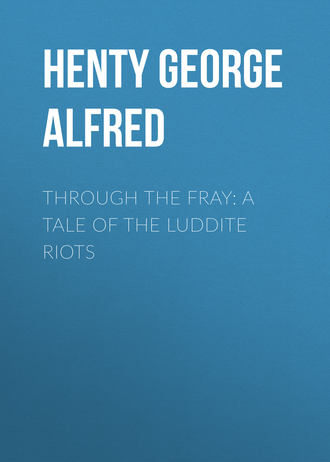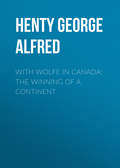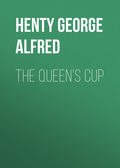
Henty George Alfred
Through the Fray: A Tale of the Luddite Riots
“Oi wonders what they be a-doing tonoight. Twice while ye ha’ been a-talking oi ha’ seen a chap a-looking in at t’ window.”
“Thou hast!” Luke exclaimed, starting up. “Dang thee, thou young fool! Why didn’t say so afore? Oi will hoide thee when oi comes back rarely! Polly, do thou run into Gardiner’s, and Hoskings’, and Burt’s; tell ‘em to cotch up a stick and to roon for their loives across t’ moor toward t’ mill. And do thou, Jarge, roon into Sykes’ and Wilmot’s and tell ‘em the same; and be quick if thou would save thy skin. Tell ‘em t’ maister be loike to be attacked.”
Catching up a heavy stick Luke hurried off, running into two cottages near and bringing on two more of the mill hands with him. He was nearly across the moor when they heard the sound of a shot. Luke, who was running at the top of his speed, gave a hoarse cry as of one who had received a mortal wound. Two shots followed in quick succession. A minute later Luke was dashing down the hollow through which the path ran down from the moor. Now he made out a group of moving figures and heard the sounds of conflict. His breath was coming in short gasps, his teeth were set; fast as he was running, he groaned that his limbs would carry him no faster. It was scarce two minutes from the time when the first shot was fired, but it seemed ages to him before he dashed into the group of men, knocking down two by the impetus of his rush. He was but just in time. A figure lay prostrate on the turf; another standing over him had just been beaten to his knee. But he sprang up again at Luke’s onward rush. His assailants for a moment drew back.
“Thou’rt joist in toime, Luke,” Bill panted out. “Oi war well nigh done.”
“Be t’ maister shot?”
“No, nowt but a clip wi’ a stick.”
As the words passed between them the assailants again rushed forward with curses and execrations upon those who stood between them and their victim.
“Moind, Luke, they ha’ got knoives!” Bill exclaimed. “Oi ha’ got more nor one slash already.”
Luke and Bill fought vigorously, but they were overmatched. Anger and fear for Ned’s safety nerved Luke’s arm, the weight of the last twenty years seemed to drop off him, and he felt himself again the sturdy young cropper who could hold his own against any in the village. But he had not yet got back his breath, and was panting heavily. The assailants, six in number, were active and vigorous young men; and Bill, who was streaming with blood from several wounds, could only fight on the defensive. Luke then gave a short cry of relief as the two men who had started with him, but whom he had left behind from the speed which his intense eagerness had given him, ran up but a short minute after he had himself arrived and ranged themselves by him. The assailants hesitated now.
“Ye’d best be off,” Luke said; “there ull be a score more here in a minute.”
With oaths of disappointment and rage the assailants fell back and were about to make off when one of them exclaimed: “Ye must carry Tom off wi’ thee. It ull never do to let un lay here.”
The men gathered round a dark figure lying a few yards away. Four of them lifted it by the hands and feet, and then they hurried away across the moor. As they did so Bill Swinton with a sigh fell across Ned’s body. In two or three minutes four more men, accompanied by George and Polly, whose anxiety would not let her stay behind, hurried up. Luke and his companions had raised Ned and Bill into a sitting posture.
“Are they killed, feyther?” Polly cried as she ran up breathless to them.
“Noa, lass; oi think as t’ maister be only stunned, and Bill ha’ fainted from loss o’ blood. But oi doan’t know how bad he be hurted yet. We had best carry ‘em back to t’ house; we can’t see to do nowt here.”
“Best let them stay here, feyther, till we can stop the bleeding. Moving would set the wounds off worse.”
“Perhaps you are right, Polly. Jarge, do thou run back to t’ house as hard as thou canst go. Loight t’ lanterns and bring ‘em along, wi’ a can o’ cold water.”
Although the boy ran to the village and back at the top of his speed the time seemed long indeed to those who were waiting. When he returned they set to work at once to examine the injuries. Ned appeared to have received but one blow. The blood was slowly welling from a wound at the back of his head.
“That war maade by a leaded stick, oi guess,” Luke said; “it’s cut through his hat, and must pretty nigh ha’ cracked his skool. One of you bathe un wi’ the water while we looks arter Bill.”
Polly gave an exclamation of horror as the light fell upon Bill Swinton. He was covered with blood. A clean cut extended from the top of the ear to the point of the chin, another from the left shoulder to the breast, while a third gash behind had cut through to the bone of the shoulder blade.
“Never moind t’ water, lass,” Luke said as Polly with trembling hands was about to wash the blood from the cut on the face, “the bluid won’t do un no harm—thou must stop t’ bleeding.”
Polly tore three or four long strips from the bottom of her dress. While she was doing so one of the men by Luke’s directions took the lantern and gathered some short dry moss from the side of the slope, and laid it in a ridge on the gaping wound. Then Luke with Polly’s assistance tightly bandaged Bill’s head, winding the strips from the back of the head round to the chin, and again across the temples and jaw. Luke took out his knife and cut off the coat and shirt from the arms and shoulder, and in the same way bandaged up the other two wounds.
After George had started to fetch the lantern, Luke had at Polly’s suggestion sent two men back to the village, and these had now returned with doors they had taken off the hinges. When Bill’s wounds were bandaged he and Ned were placed on the doors, Ned giving a faint groan as he was moved.
“That’s roight,” Luke said encouragingly; “he be a-cooming round.”
Two coats were wrapped up and placed under their heads, and they were then lifted and carried off, Polly hurrying on ahead to make up the fire and get hot water.
“Say nowt to no one,” Luke said as he started. “Till t’ master cooms round there ain’t no saying what he’d loike done. Maybe he won’t have nowt said aboot it.”
The water was already hot when the party reached the cottage; the blood was carefully washed off Ned’s head, and a great swelling with an ugly gash running across was shown. Cold water was dashed in his face, and with a gasp he opened his eyes.
“It be all roight, Maister Ned,” Luke said soothingly; “it be all over now, and you be among vriends. Ye’ve had an ugly one on the back o’ thy head, but I dowt thou wilt do rarely now.”
Ned looked round vaguely, then a look of intelligence came into his face.
“Where is Bill?” he asked.
“He be hurted sorely, but oi think it be only loss o’ blood, and he will coom round again; best lie still a few minutes, maister, thou wilt feel better then; Polly, she be tending Bill.”
In a few minutes Ned was able to sit up; a drink of cold brandy and water further restored him. He went to the bed on which Bill had been placed.
“He’s not dead?” he asked with a gasp, as he saw the white face enveloped in bandages.
“No, surelie,” Luke replied cheerfully; “he be a long way from dead yet, oi hoape, though he be badly cut about.”
“Have you sent for the doctor?” Ned asked.
“No!”
“Then send for Dr. Green at once, and tell him from me to come up here instantly.”
Ned sat down in a chair for a few minutes, for he was still dazed and stupid; but his brain was gradually clearing. Presently he looked up at the men who were still standing silently near the door.
“I have no doubt,” he said, “that I have to thank you all for saving my life, but at present I do not know how it has all come about. I will see you tomorrow. But unless it has already got known, please say nothing about this. I don’t want it talked about—at any rate until we see how Bill gets on.
“Now, Luke,” he continued, when the men had gone, “tell me all about it. My brain is in a whirl, and I can hardly think.”
Luke related the incidents of the fight and the flight of the assailants, and said that they had carried off a dead man with them. Ned sat for some time in silence.
“Yes,” he said at last, “I shot one. I was walking along with Bill when suddenly a gun was fired from a bush close by; then a number of men jumped up and rushed upon us. I had my pistol, and had just time to fire two shots. I saw one man go straight down, and then they were upon us. They shouted to Bill to get out of the way, but he went at them like a lion. I don’t think any of the others had guns; at any rate they only attacked us with sticks and knives. I fought with my back to Bill as well as I could, and we were keeping them off, till suddenly I don’t remember any more.”
“One on them hit ye from behind wi’ a loaded stick,” Luke said, “and thou must ha’ gone doon like a felled ox; then oi expects as Bill stood across thee and kept them off as well as he could, but they war too much for t’ lad; beside that cut on the head he ha’ one on shoulder and one behind. Oi war only joost in toime, another quarter of a minute and they’d ha’ got their knives into thee.”
“Poor old Bill,” Ned said sadly, going up to the bedside and laying his hand on the unconscious figure. “I fear you have given your life to save one of little value to myself or any one else.”
“Don’t say that, Master Ned,” Polly said softly; “you cannot say what your life may be as yet, and if so be that Bill is to die, and God grant it isn’t so, he himself would not think his life thrown away if it were given to save yours.”
But few words were spoken in the cottage until Dr. Green arrived. Ned’s head was aching so that he was forced to lie down. Polly from time to time moistened Bill’s lips with a few drops of brandy. George had been ordered off to bed, and Luke sat gazing at the fire, wishing that there was something he could do.
At last the doctor arrived; the messenger had told him the nature of the case, and he had come provided with lint, plaster, and bandages.
“Well, Ned,” he asked as he came in, “have you been in the wars again?”
“I am all right, doctor. I had a knock on the head which a day or two will put right; but I fear Bill is very seriously hurt.”
The doctor at once set to to examine the bandages.
“You have done them up very well,” he said approvingly; “but the blood is still oozing from them. I must dress them afresh; get me plenty of hot water, Polly, I have brought a sponge with me. Can you look on without fainting?”
“I don’t think I shall faint, sir,” Polly said quietly; “if I do, feyther will take my place.”
In a quarter of an hour the wounds were washed, drawn together, and bandaged. There was but little fresh bleeding, for the lad’s stock of life blood had nearly all flowed away.
“A very near case,” the doctor said critically; “as close a shave as ever I saw. Had the wound on the face been a quarter of an inch nearer the eyebrow it would have severed the temporal artery. As it is it has merely laid open the jaw. Neither of the other wounds are serious, though they might very well have been fatal.”
“Then you think he will get round, doctor?” Ned asked in a low tone.
“Get round! Of course he will,” Dr. Green replied cheerily. “Now that we have got him bound up we will soon bring him round. It is only a question of loss of blood.”
“Hullo! this will never do,” he broke off as Ned suddenly reeled and would have fallen to the ground had not Luke caught him.
“Pour this cordial down Swinton’s throat, Polly, a little at a time, and lift his head as you do it, and when you see him open his eyes, put a pillow under his head; but don’t do so till he begins to come round. Now let me look at Ned’s head.
“It must have been a tremendous blow, Luke,” he said seriously. “I, only hope it hasn’t fractured the skull. However, all this swelling and suffusion of blood is a good sign. Give me that hot water. I shall put a lancet in here and get it to bleed freely. That will be a relief to him.”
While he was doing this an exclamation of pleasure from Polly showed that Bill was showing signs of returning to life. His eyes presently opened. Polly bent over him.
“Lie quiet, Bill, dear; you have been hurt, but the doctor says you will soon be well again. Yes; Master Ned is all right too. Don’t worry yourself about him.”
An hour later both were sleeping quietly.
“They will sleep till morning,” Dr. Green said, “perhaps well on into the day; it is no use my waiting any longer. I will be up the first thing.”
So he drove away, while Polly took her work and sat down to watch the sleepers during the night, and Luke, taking his stick and hat, set off to guard the mill till daylight.
Ned woke first just as daylight was breaking; he felt stupid and heavy, with a splitting pain in his head. He tried to rise, but found that he could not do so. He accordingly told George to go down in an hour’s time to Marsden, and to leave a message at the house saying that he was detained and should not be back to breakfast, and that probably he might not return that night. The doctor kept his head enveloped in wet bandages all day, and he was on the following morning able to go down to Marsden, although still terribly pale and shaken. His appearance excited the liveliest wonder and commiseration on the part of Charlie, Lucy, and Abijah; but he told them that he had had an accident, and had got a nasty knock on the back of his head. He kept his room for a day or two; but at the end of that time he was able to go to the mill as usual. Bill Swinton was longer away, but broths and jellies soon built up his strength again, and in three weeks he was able to resume work, although it was long before the ugly scar on his face was healed. The secret was well kept, and although in time the truth of the affair became known in Varley it never reached Marsden, and Ned escaped the talk and comment which it would have excited had it been known, and, what was worse, the official inquiry which would have followed.
The Huddersfield men naturally kept their own council. They had hastily buried their dead comrade on the moor, and although several of them were so severely knocked about that they were unable to go to work for some time, no rumor of the affair got about outside the circle of the conspirators. It need hardly be said that this incident drew Ned and Bill even more closely together than before, and that the former henceforth regarded Bill Swinton in the light of a brother.
At the end of the Christmas holidays Mr. Porson brought home a mistress to the schoolhouse. She was a bright, pleasant woman, and having heard from her husband all the particulars of Ned’s case she did her best to make him feel that she fully shared in her husband’s welcome whenever he came to the house, and although Ned was some little time in accustoming himself to the presence of one whom he had at first regarded as an intruder in the little circle of his friends, this feeling wore away under the influence of her cordiality and kindness.
“Is it not shocking,” she said to her husband one day, “to think that for nearly a year that poor lad should never have seen his own mother, though she is in the house with him, still worse to know that she thinks him a murderer? Do you think it would be of any good if I were to go and see her, and tell her how wicked and wrong her conduct is?”
“No, my dear,” Mr. Porson said, smiling, “I don’t think that course would be at all likely to have a good effect. Green tells me that he is sure that this conviction which she has of Ned’s guilt is a deep and terrible grief to her. He thinks that, weak and silly as she is, she has really a strong affection for Ned, as well as for her other children, and it is because this is so that she feels so terribly what she believes to be his guilt. She suffers in her way just as much, or more, than he does in his. He has his business, which occupies his mind and prevents him from brooding over his position; besides, the knowledge that a few of us are perfectly convinced of his innocence enables him to hold up. She has no distraction, nothing to turn her thoughts from this fatal subject.
“Green says she has several times asked him whether a person could be tried twice for the same offense, after he has been acquitted the first time, and he believes that the fear is ever present in her mind that some fresh evidence may be forthcoming which may unmistakably bring the guilt home to him. I have talked it over with Ned several times, and he now takes the same view of it as I do. The idea of his guilt has become a sort of monomania with her, and nothing save the most clear and convincing proof of his innocence would have any effect upon her mind. If that is ever forthcoming she may recover, and the two may be brought together again. At the same time I think that you might very well call upon her, introducing yourself by saying that as I was a friend of Captain Sankey’s and of her sons you were desirous of making her acquaintance, especially as you heard that she was such an invalid. She has no friends whatever. She was never a very popular woman, and the line every one knows she has taken in reference to the murder of her second husband has set those who would otherwise have been inclined to be kind against her. Other people may be convinced of Ned’s guilt, but you see it seems to every one to be shocking that a mother should take part against her son.”
Accordingly Mrs. Porson called. On the first occasion when she did so Mrs. Mulready sent down to say that she was sorry she could not see her, but that the state of her health did not permit her to receive visitors. Mrs. Porson, however, was not to be discouraged. First she made friends with Lucy, and when she knew that the girl was sure to have spoken pleasantly of her to her mother she opened a correspondence with Mrs. Mulready. At first she only wrote to ask that Lucy might be allowed to come and spend the day with her. Her next letter was on the subject of Lucy’s music. The girl had long gone to a day school kept by a lady in Marsden, but her music had been neglected, and Mrs. Porson wrote to say that she found that Lucy had a taste for music, and that having been herself well taught she should be happy to give her lessons twice a week, and that if Mrs. Mulready felt well enough to see her she would like to have a little chat with her on the subject.
This broke the ice. Lucy’s backwardness in music had long been a grievance with her mother, who, as she lay in bed and listened to the girl practicing below had fretted over the thought that she could obtain no good teacher for her in Marsden. Mrs. Porson’s offer was therefore too tempting to be refused, and as it was necessary to appear to reciprocate the kindness of that lady, she determined to make an effort to receive her.
The meeting went off well. Having once made the effort Mrs. Mulready found, to her surprise, that it was pleasant to her after being cut off for so many months from all intercourse with the world, except such as she gained from the doctor, her two children, and the old servant, to be chatting with her visitor, who exerted herself to the utmost to make herself agreeable. The talk was at first confined to the ostensible subject of Mrs. Porson’s visit; but after that was satisfactorily arranged the conversation turned to Marsden and the neighborhood. Many people had called upon Mrs. Porson, and as all of them were more or less known to Mrs. Mulready, her visitor asked her many questions concerning them, and the invalid was soon gossiping cheerfully over the family histories and personal peculiarities of her neighbors.
“You have done me a world of good,” she said when Mrs. Porson rose to leave. “I never see any one but the doctor, and he is the worst person in the world for a gossip. He ought to know everything, but somehow he seems to know nothing. You will come again, won’t you? It will be a real kindness, and you have taken so much interest in my daughter that it quite seems to me as if you were an old friend.”
And so the visit was repeated: but not too often, for Mrs. Porson knew that it was better that her patient should wait and long for her coming, and now that the ice was once broken, Mrs. Mulready soon came to look forward with eagerness to these changes in her monotonous existence.
For some time Ned’s name was never mentioned between them. Then one day Mrs. Porson, in a careless manner, as if she had no idea whatever of the state of the relations between mother and son, mentioned that Ned had been at their house the previous evening, saying: “My husband has a wonderful liking and respect for your son; they are the greatest friends, though of course there is a good deal of difference in age between them. I don’t know any one of whom John thinks so highly.”
Mrs. Mulready turned very pale, and then in a constrained voice said: “Mr. Porson has always been very kind to my sons.”
Then she sighed deeply and changed the subject of conversation.
“Your wife is doing my patient a great deal more good than I have ever been able to do,” Dr. Green said one day to the schoolmaster. “She has become quite a different woman in the last five or six weeks. She is always up and on the sofa now when I call, and I notice that she begins to take pains with her dress again; and that, you know, is always a first rate sign with a woman. I think she would be able to go downstairs again soon, were it not for her feeling about Ned. She would not meet him, I am sure. You don’t see any signs of a change in that quarter, I suppose?”
“No,” Mrs. Porson replied. “The last time I mentioned his name she said: ‘My son is a most unfortunate young man, and the subject pains me too much to discuss. Therefore, if you please, Mrs. Porson, I would rather leave it alone.’ So I am afraid there is no chance of my making any progress there.”







